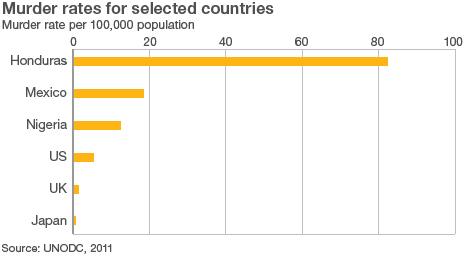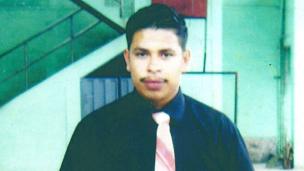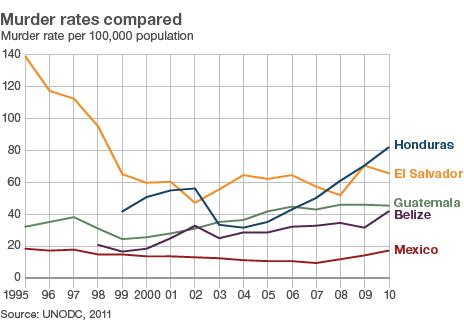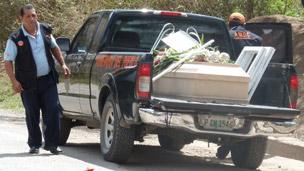Honduras murders: Where life is cheap and funerals are free
- Published
Honduras: murder capital of the world
Honduras has the world's highest murder rate. Many victims are poor. And one politician campaigning for election made an unusual vote-winning promise - free funerals for anyone unable to give a loved-one a dignified burial.
Early one Saturday morning the phone rings at the People's Funeral Service on a noisy main street in Tegucigalpa, the Honduran capital.
On the phone is one of the workers from the city's mortuary. A family needs help. Another young man was gunned down in the street the previous day, and his relatives do not have the cash to give him a decent funeral.
At the back of the building there is a stack of new coffins, some beige, some grey.
Within hours, a black pick-up truck with Funeraria del Pueblo painted in orange on its sides is on its way to the mortuary, with an empty coffin on board.
The vehicle is also carrying a stand for the coffin, curtains and candles, and coffee and bread for mourners at the wake.
This will be held in the family's local church, before 26-year-old Ramon Orlando Varela is buried in a plot also provided by the People's Funeral Service.
It is a comprehensive service offered free of charge to the poor of the city by the office of the mayor of Tegucigalpa, Ricardo Alvarez.
"When I was campaigning to be mayor, nearly seven years ago, I found that people were being buried in plastic garbage bags," he remembers.
"I said, 'That cannot happen in my country, in my city.' So I've been running the funeral service for the last six years, and this is my seventh year."

Tragically, this is a service that is needed now more than ever in Honduras.

Ramon Orlando Varela had just dropped his children off at school when he was shot
The National Commission for Human Rights has calculated that there is a violent death every 74 minutes in this small nation of about eight million people.
Last year Honduras recorded the highest murder rate in the world, with 86 people killed for every 100,000 inhabitants, up from 82 in 2010.
In the UK the rate is just over one, in Mexico, 18.
The majority of those who die a violent death in Honduras - like Ramon - are killed with a gun.
But the reasons for the explosion of killings - almost a doubling of the murder rate since 2005 - are complex.

Corruption, gangs and guns have been around for decades.
In 2009, the coup against the government of President Manuel Zelaya brought a wave of political killings. And now Hondurans must contend with the presence of Mexican drug cartels that have pushed south and gained a foothold.
No-one is safe. And activists, journalists and lawyers all continue to be the targets of assassins.
But it is not just victims of violence who are helped by the People's Funeral Service.
Miguel Antonio Bueso Redondo arrives early one morning.
"My wife gave birth to twins by Caesarean section," he says.
"We thought everything was fine, but then one of the babies was bleeding… The baby died.
"I didn't have any money for a coffin... One of the nurses at the hospital told me about this service, and did all the paperwork for me. That's why I'm here."
After completing the formalities, Miguel Antonio leaves carrying a small white coffin on his shoulder.
The People's Funeral Service is open every day, 24 hours a day. Calls come in day and night from the city's mortuary, the hospital and from people who have heard about it from friends and relatives.
Eighteen staff work shifts, and there are two funeral homes. Both are equipped with everything families need for a wake which usually lasts 12-14 hours.
In the poor barrio of Los Laureles in the north of Tegucigalpa, the workers from the People's Funeral Service carry Ramon's coffin into the simple, wooden Evangelical church. Then they serve coffee to the many mourners who have gathered.
For Erica Fuentes, the mother of Ramon's two daughters, the People's Funeral Service has relieved her of a lot of stress - a private funeral service would cost around $1,000 (£620).
She was with Ramon when he was killed, and is struggling to come to terms with his death.

"We were coming back from dropping the girls at school when it happened," she says. "I think Ramon was shot because of a mistake. At the time we were very close together, arm in arm, so maybe God helped me and saved me."
The next day, the pick-up truck returns to Los Laureles to take Ramon's body to the cemetery for the burial service.
Yoni Alexander Osorio Hernandez, one of the staff from the People's Funeral Service, makes sure everything runs smoothly for the final journey.
"We also hurt for the families - especially because there is so much violence in our country.
"Most of the families who come to La Funeraria del Pueblo are very poor indeed.
"This is a service based on solidarity - solidarity with those families at a very difficult time for them."
<bold>You can hear Linda Pressly's full report in </bold> <link> <caption>Crossing Continents on BBC Radio 4</caption> <url href="http://www.bbc.co.uk/programmes/b01gvthm" platform="highweb"/> </link> <bold> on Thursday 3 May at 11:00 BST and on Monday 7 May at 20:30 BST. You can also </bold> <link> <caption>listen on the Radio 4 website</caption> <url href="http://www.bbc.co.uk/programmes/b01gvthm" platform="highweb"/> </link> <bold> or </bold> <link> <caption>download the podcast. </caption> <url href="http://www.bbc.co.uk/podcasts/series/cc" platform="highweb"/> </link>